|
November 1, 2011 07:46:38
Posted By DelvecchioRC
|
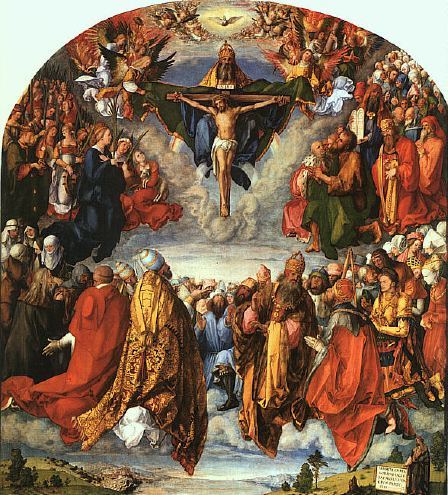
In Catholicism, All Saints' Day is a Holy Day of Obligation in many countries including the United States, meaning going to Mass on the date is required unless one has a good reason to be excused from that obligation, such as illness.
All Saints' Day (in the Roman Catholic Church officially the Solemnity of All Saints and also called All Hallows or Hallowmas), often shortened to All Saints, is a solemnity celebrated on 1 November by parts of Western Christianity, and on the first Sunday after Pentecost in Eastern Christianity, in honour of all the saints, known and unknown.
In Western Christian theology, the day commemorates all those who have attained the beatific vision in Heaven. It is a national holiday in many historically Catholic countries. In the Roman Catholic Church and many Anglican churches, the next day, All Souls' Day, specifically commemorates the departed faithful who have not yet been purified and reached heaven. Christians celebrate All Saints' Day and All Souls' Day in the fundamental belief that there is a prayerful spiritual bond between those in the state of grace who have burned and are either being purified in purgatory or are in heaven (the 'Church Suffering' and the 'church triumphant', respectively), and the 'church militant' who are the living.
Mass tonight at Sacred Hearts-St. Stephen Church is at 7pm for All Saints
|
|
October 20, 2011 12:55:14
Posted By DelvecchioRC
|
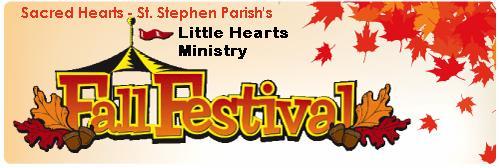
Sacred Hearts-St. Stephen Family Ministry
"Little Hearts"
Presents its
Family Fall Festival
Saturday, October 29th 2011
11AM – 4PM
SH-SS Church Yard
125 Summit ST.
(Rain Location – Lower Church at same address)
Admission only $2.00
- Have fun with Lolly Flop the Clown -12 – 1:30
- Come dressed for our Costume Contest – 2pm
- Kid’s concert - 2:30 – 4pm
- Come select a Pumpkin from our Patch
- Have Fun in the Bouncy Castle & Jumbo Slide
- Take a chance for one of our amazing Raffle Gifts
- Enjoy kid & family friendly Food
- Arts, Crafts, Games & much more…
Log onto www.sacredhearts-ststephen.com for more info
|
|
August 15, 2011 01:14:22
Posted By DelvecchioRC
|
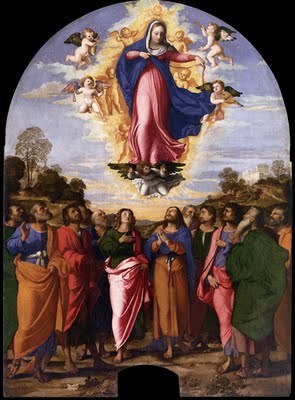
According to the belief of Christians of the Roman Catholic Church, the Eastern Catholic Churches, Eastern Orthodoxy, Oriental Orthodoxy, and parts of the Anglican Communion and Continuing Anglicanism, the Assumption of Mary was the bodily taking up of the Virgin Mary into Heaven at the end of her life. The Roman Catholic Church teaches as dogma that the Virgin Mary "having completed the course of her earthly life, was assumed body and soul into heavenly glory." This doctrine was dogmatically and infallibly defined by Pope Pius XII on November 1, 1950, in his Apostolic Constitution Munificentissimus Deus. In this dogmatic statement, the phrase "having completed the course of her earthly life," leaves open the question of whether the Virgin Mary died before her assumption or whether she was assumed before death; both possibilities are allowed. Mary's assumption is said to have been a divine gift to her as the 'Mother of God'. This belief is known as the Dormition of the Theotokos by the Eastern and Oriental Orthodox Churches. In the churches which observe it, the Assumption is a major feast day, commonly celebrated on August 15. In many countries it is a Catholic Holy Day of Obligation.
|
|
June 24, 2011 08:32:08
Posted By DelvecchioRC
|
Photo of Corpus Christi Procession from Sacred Hearts of Jesus and Mary PArish in the 1930's on Vanbrunt and Union Streets
The celebration of Corpus Christi became widespread only after both St. Juliana and Bishop Robert de Thorete had died. In 1263 Pope Urban IV investigated claims of a Eucharistic miracle at Bolsena, in which a consecrated host began to bleed. In 1264 he issued the papal bull Transiturus de hoc mundo in which Corpus Christi was made a feast throughout the entire Latin Rite. This was the very first papally sanctioned universal feast in the history of the Latin Rite.
A new liturgy for the feast was composed by St. Thomas Aquinas. This liturgy has come to be used not only on the Feast of Corpus Christi itself but also throughout the liturgical year at events related to the Blessed Sacrament. The hymn Aquinas composed for Vespers of Corpus Christi, Pange Lingua, is also used on Holy (Maundy) Thursday during the procession of the Blessed Sacrament to the altar of repose. The last two verses of Pange Lingua are also used as a separate hymn, Tantum Ergo, which is sung at Benediction of the Blessed Sacrament. O Salutaris Hostia, another hymn sung at Benediction of the Blessed Sacrament, comprises the last two verses of Verbum Supernum Prodiens, Aquinas' hymn for Lauds of Corpus Christi. Aquinas also composed the propers for the Mass of Corpus Christi, including the sequence Lauda Sion Salvatorem. The epistle reading for the Mass was taken from Paul's First Epistle to the Corinthians (1 Corinthians 11:23-29), and the Gospel reading was taken from the Gospel of John (John 6:56-59).
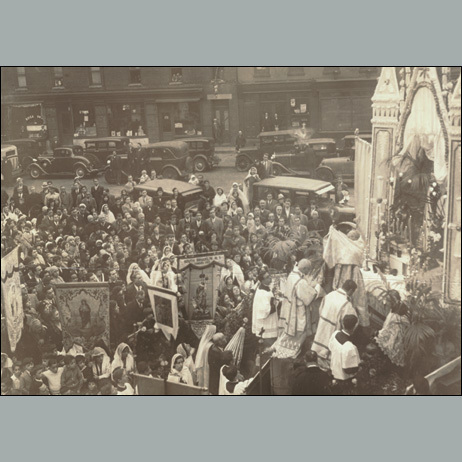
Corpus Christi
|
Categories:
Events,
History
|
June 24, 2011 08:19:06
Posted By DelvecchioRC
|
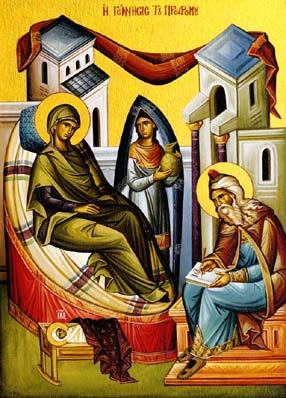
The day of a Saint's death is usually celebrated as his or her feast day, but Jesus, the Virgin Mary and Saint John the Baptist, while not being exceptions to this rule, also have feast days that celebrate their earthly birth. The reason is that St. John (Lk 1:15), like Jeremiah (Jer 1:5) and the Blessed Virgin, was purified from original sin before his very birth (in Catholic doctrine), though not in the instant of conception as in the latter case.
The Nativity of St John the Baptist is one of the oldest festivals of the Christian church, being listed by the Council of Agde in 506 as one of that region's principal festivals, where it was a day of rest and, like Christmas, was celebrated with three Masses: a vigil, at dawn, and at midday.
The Nativity of St John the Baptist on June 24 comes three months after the celebration on March 25 of the Annunciation, when the Archangel Gabriel told Our Lady that her cousin Elizabeth was in her sixth month of pregnancy, and six months before the Christmas celebration of the birth of Jesus. The purpose of these festivals is not to celebrate the exact dates of these events, but simply to commemorate them in an interlinking way.
Christians have long interpreted the life of John the Baptist as a preparation for the coming of Jesus Christ, and the circumstances of his birth, as recorded in the New Testament, are miraculous. The sole biblical account of birth of John the Baptist comes from the Gospel of Luke. John’s parents, Zechariah or Zachary — a Jewish priest — and Elizabeth, were without children and both were beyond the age of child-bearing. During Zechariah's rotation to serve in the Temple in Jerusalem, he was chosen by lot to offer incense at the Golden Altar in the Holy Place. The Archangel Gabriel appeared to him and announced that he and his wife would give birth to a child, and that they should name him John. However, because Zechariah did not believe the message of Gabriel, he was rendered speechless until the time of John's birth; at that time, his relatives wanted to name the child after his father, and Zechariah wrote, "His name is John" and could speak (Luke 1:5-25; 1:57-66). Following Zechariah's obedience to the command of God, he was given the gift of prophecy, and foretold the future ministry of John (Luke 1:67-79).
At the Annunciation, when the Archangel Gabriel appeared to the Virgin Mary to inform her that she would conceive of the Holy Ghost Jesus, he also informed her that Elizabeth, her cousin, was already six months pregnant (Luke 1:36). Mary then journeyed to visit Elizabeth. Luke’s Gospel recounts that the baby “leapt” in Elizabeth’s womb at the greeting of Mary (Luke 1:44). This is interpreted by Christians as John's first act of prophecy.
|
|
|
|



